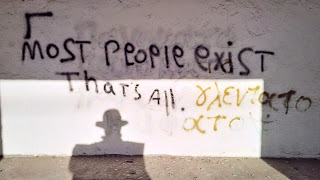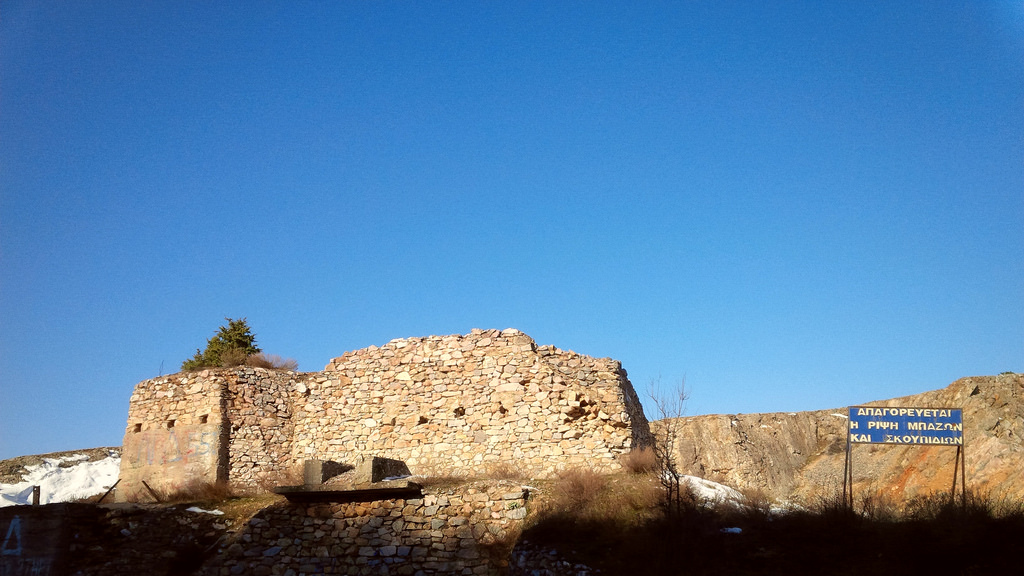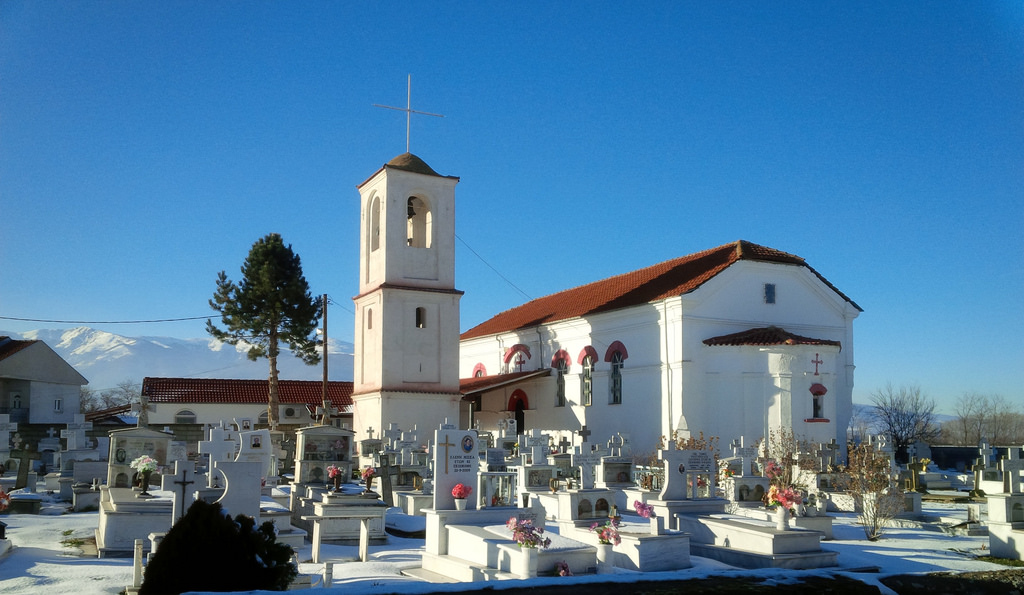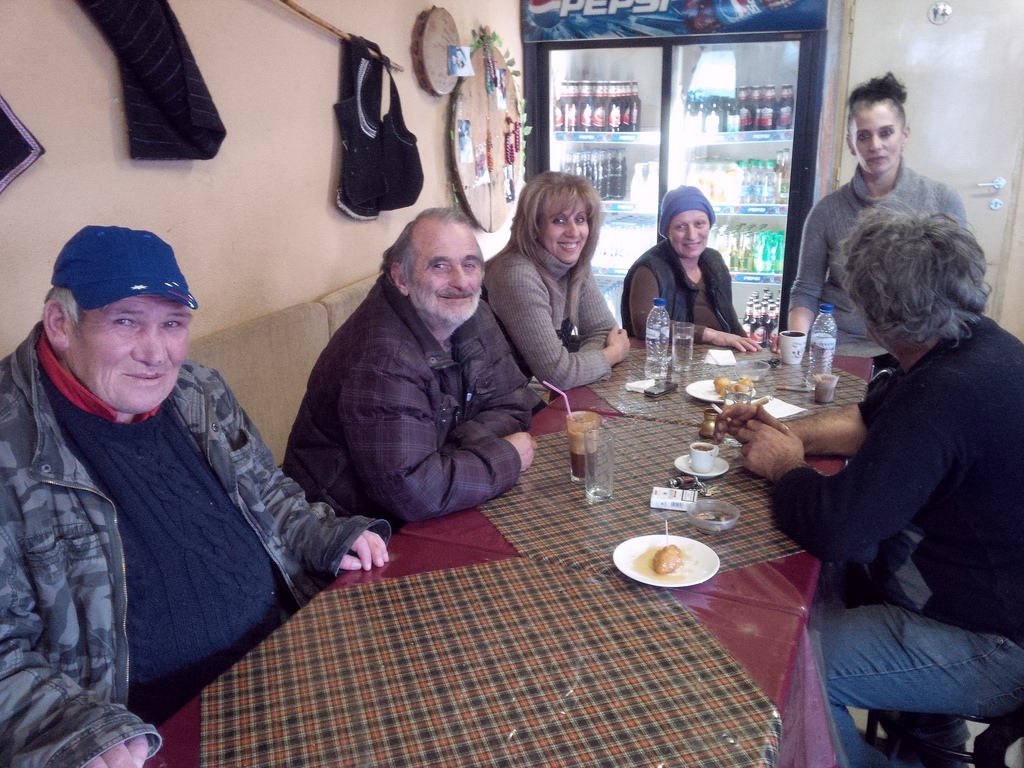Bitola to Florina:
After leaving Bitola, located at the northwest edge of a large plain, I headed south and a little east towards the Greek border. This plain is ringed with mountains on all sides, and at the start of my day, the peaks were all snowcapped. There was also a fair bit on the ground, left over from the snowfall on my first night in Bitola. As usual, I’d consulted the Via Egnatia guidebook and decided against walking through the small villages in the foothills, opting instead to follow the lightly travelled road that led across the plain directly to the border. In spite of the snow, it was quite warm, and I soon had my sleeves rolled up.
The border crossing was uneventful, and when I reached the first town across the border I decided it was time for lunch. The guidebook had mentioned that staying in Niki was possible, but that a traveller would have to ask about private rooms for the night in one of the cafés. Perhaps Niki is not a ghost town in the warmer months, but all three cafés I saw were shuttered, as were the two small shops. The snow covered playground of the tiny school didn’t have any footprints , and this was a Tuesday! I seated myself at a table on the covered patio of one of the cafés, tweeted that I was in Greece, and tucked in to my supplies.
The VE guidebook indicated that next two towns listed were also of the “ask around” nature, so rather than risk sleeping on the street, I decided to head south and a little west to the city of Florina. That did add a few hours of walking to this section, but I was also concerned about the section between Meliti (which I bypassed on Wednesday) and Kelli (which I walked through on Thursday). According to my GPS app, the road ends in Meliti, with an 1100 m peak between that town and the next. This was borne out by the directions in the guidebook. At this time of year in this part of the world, that kind of altitude guarantees there will be plenty of snow on the ground, and the last two times I followed the VE over mountain passes, it got quite challenging.
So, Florina it was! From Niki, there was a choice of three routes: the main road which curved east and then back west, the secondary road which turned immediately west and skirted the base of the mountain range ringing the plain, and a single lane farm track that led almost due south through two villages before connecting with a secondary road that led directly to Florina.
The farm track hadn’t been plowed, but there was a clear set of tire tracks the whole way. The first village I reached was virtually empty. Lots of large farm machinery parked on the street, and even more abandoned homes, crumbling and overgrown. The next village was larger and more populated. When I saw a café, I realized I hadn’t had any caffeine all day, so in I went. Heads turned, but soon enough I was sitting at a long table with several of the locals. One of the women had lived in Hamilton for twenty years, so she translated some of what was going on. I was offered some loukoumades (yummy!), and when I went to pay for my coffee, I was told that it was taken care of. I posted the photo of the group to Flickr a few days ago. My benefactor was the one who refused to face the camera. Who am I to complain? I arrived in Florina after dark, but my GPS app led me directly to a hotel. Along the way, I discovered that the large and aggressive looking dogs which roam free in Greece are easily cowed. A loud and stern shout, accompanied by a stooping motion and then a throw of an imaginary rock will get them to turn tail.
Florina to Vevi:
Another day of warm sunshine after a sub-freezing night, and another few hours of walking with my sleeves up. I think I like Greece! My walk today led me east and south across the vast mountain-ringed plain. After several hours of walking, the southwestern range came into clearer focus, and I could see they were lower than the hills farther north, and also snow-free, probably because the peaks were exposed to the warm sun all day. The snow was also gradually melting away as I walked. Looking back across the plain, I could see a faint haze obscuring the mountains on the far side. My guess is it was from all the snow melting and evaporating. The last few hours as I approached my destination saw me enter gently sloping foothills. As the sun drew near the horizon, it did start to get rather chilly, so when I arrived in Vevi, I was quite happy to take refuge in the first café I saw. It’s not a large village, and my GPS app didn’t indicate any hotels in the area, so all I could do was follow the advice of my guidebook (given for a different town) and ask if there was anywhere in town I could spend the night. Nobody in the café spoke English, so this involved using my smartphone to display the “survival phrases” I’d compiled before I left. I was in luck! The guy who’d been talking at me in Greek in a very friendly and engaging manner took me outside and pointed the way. He also told me he’d pay for my coffee, but then he just got up and left without settling either of our tabs. Thinking I must have misunderstood him, I paid for my coffee and headed down the road.
The sun had set and a wind picked up while I was nursing my coffee and repeating the phrase “Then katalaveno.” (I don’t understand.) The hotel was a few hundred metres away, and I was very glad to arrive. (Maybe I should have added an extra layer or two before leaving the café. Ya think?) Leonidas speaks English fluently, and after leaving my pack in my room, we were soon deep in a theological discussion. At one point, he apologised for keeping me talking, which made me laugh. Here was a man who actually thought about these matters, and cared enough to share his questions and observations with a total stranger! I was something of a curiosity to him, since I’d been raised in one faith tradition and after years of study had entered a different one. I was able to offer him perspectives on Orthodoxy that he hadn’t encountered before, and I think he appreciated hearing about the faith he’d been born into from a convert’s perspective. Eventually I excused myself and set out to find dinner. When I returned, the ground floor was full of people watching a football match (that’s “soccer” to you North Americans), so I headed up to my room where I showered and posted a few catch-up messages. By the time I came back down, the place was empty except for one man sitting at the bar speaking with Leonidas, and my friend from earlier in the evening. This time there was no mistake, and he bought me a beer which I sipped as we looked at the computer monitor where Leonidas was browsing through my Flickr sets. (Interesting observation: in Italy when I told people of my plans, they were marvelled at the distance. In Greece, people immediately latch on to the destination. Finally, I don’t have to explain why! Pascha in Jerusalem is a self-evident good here.) My other beer was courtesy of my host.
After everyone else had left, Leonidas and I chatted a bit longer, but I knew he finished work at midnight and I felt bad about keeping him from his home. Well, and I also felt tired. We added one another as friends on Facebook and said goodbye. When I arrive in Jerusalem (God willing!) I will light a candle for him. (My list of friends and benefactors continues to grow, and in addition to my prayers of gratitude along the way, I will specifically commemorate each one when I reach my destination.)
Vevi to Arnissa:
Vevi is in the foothills, and the walk out of town on the old road was very steep – just what’s needed to combat the morning chill! As I walked uphill past the school, I glanced down and caught the eye of a student who was gazing out the window. I waved, and then waved again a few seconds later as the teacher and the rest of the students looked up at me. Booyeah! Leonidas had told me that this road would be practically deserted, and he was right. It was a steady climb up from Vevi to the town of Kelli, and when I saw a café there I was glad to sit down and have a (very large) Greek coffee. The café also had WiFi, so I replied to a few messages and checked the weather and Facebook. My elevation was now 400 m above Vevi – the road was clear but the snow on either side was fairly deep and the wind was quite cold. I was very glad I had not followed the Via Egnatia cross-country and over the higher pass to Kelli!
Once I’d left the village behind, the wind died down and I soon shed my wind-proof jacket. As I continued to descend, the sleeves were rolled up, and I soon left the snow and ice behind me. (Except where the surrounding peaks cast a permanent shadow.) For hours, the only sound I heard were birds and my own footsteps. I might have seen a car every half hour, so the peace was virtually undisturbed. I could hear vehicles approaching a minute or more before they finally passed me.
By 1:45, I had rounded a turn in the mountains and saw my destination ahead of me in the distance. It was less than 8 kms away as the crow flies, but the road was hardly that direct. It took another three and a half hours before I finally arrived in Arnissa, and just as the night before, I had no idea where I would be spending the night. Barely 50 m to my left from the first intersection was a bar. Since it had worked so well the night before, I headed in and ordered a drink. By the time I got around to asking about a place to stay, a young woman had come in to get a coffee to go. Turns out she speaks English, and had the number of a hotel in town. She called the proprietor, relayed the pertinent information, a nd told me he’d be coming to pick me up in a few minutes. Then she took her coffee and headed out the door, accompanied by my thanks.
The hotel was just a few hundred metres away, but after checking me in and a brief conversation in Greek (I don’t speak Greek!), Kyriakos headed off again. Our conversation consisted of me reading from my “survival phrases” cheat sheet to tell him I am an Orthodox Christian pilgrim who’s walking to Jerusalem for Pascha. Turns out his mother had been there many years before, and he was himself planning a trip to Mount Athos later this year. I picked up a few supplies from the supermarket around the corner, and then fell asleep shortly after listening to The World This Hour on the CBC. I woke up three hours later, and stayed awake until almost 4:00 am. Arggh! I changed my alarm to allow for a few extra hours of sleep and went back to bed. (I changed times zones when I entered Greece, jumping to GMT+2. I hadn’t expected it to make a difference, but I’ve been starting my walking quite late ever since. The good news is, I’ll be in this time zone until I head west again. {I think. Anyone know which time zone Bulgaria is in?})
Arnissa to Edessa:
Another late start (11:00 AM) and steep climb to begin my day, but it was a very short walk today – only 24 kms. More walking in the sun with my sleeves up, and the only snow I’d seen since descending from Kelli the day before was on the highest surrounding peaks. Before leaving Arnissa, I stopped at a cafe for a Greek coffee, and shortly after she delivered that, the proprietor came to my table with a small dessert plate, on the house. (Yes, I think I like Greece!) Thanks to quite a few kilometres of extensive road work, I had a whole lane to myself for much of the walk, with either a crash barrier or traffic cones marking the extent of my demesne. It was a very gradual uphill climb most of the day, but the terrain shifted about an hour outside of Edessa, leading downhill on grades that were as steep as 10% at times. I had paused for a break on the wide shoulder of a hairpin turn overlooking the city a few kilometres away when a small pickup truck pulled off the road on the gravel and stopped in front of me. The passenger was none other than my helpful friend from Vevi. We were still faced with mutual incomprehension, but we had a short and friendly exchange before they headed on their way again.
From the hills above, I had seen that Edessa is a small city. As I walked through it towards the old centre where the hotels were located, I realized I hadn’t seen this many shops since leaving Florina. (If I’d hunted long enough, I probably would have found a laundromat. I didn’t bother, having done my laundry in the bathtub {Yes, bathtub! A very rare find in a hotel in the Balkans!} the night before.) I checked in to the first hotel I came across, just on the edge of the old city. After unpacking and having a short rest, I went off to explore. It was dark by then, but wandering the mediaeval quarter was quite nice. The two 14th century churches I found were both closed, but I’ll walk past them in the morning on the off chance I’ll be able to glance inside.
The city is situated along the edge of a cliff which overlooks the plain leading to Thessaloniki and the Aegean Sea. For this reason, and also because of the two rivers which flow through town (and then over the cliff), Edessa has been continuously inhabited since the 6th century BC. The earliest settlement was at the foot of the cliff, and I’ll be walking through the archaeological site as I make my way towards my next destination.
After several short walking days, as dictated by the course of the road and location of towns, I face a much longer walk on Saturday. No 11:00 AM start for me! The sun rises at 7:55 and sets at 5:30, so I intend to take full advantage of the available daylight as I trek onwards to Giannitsa.






